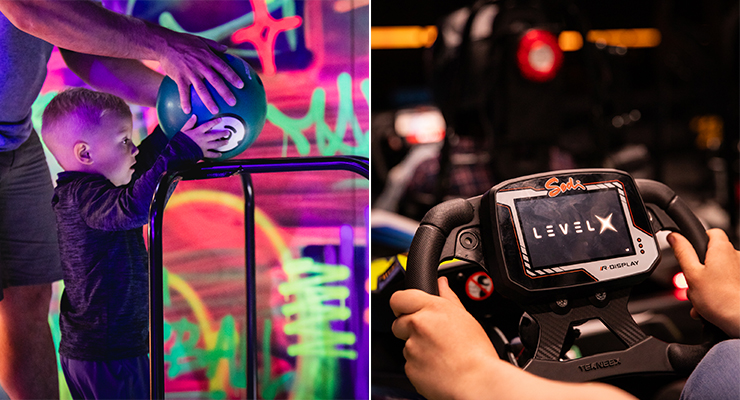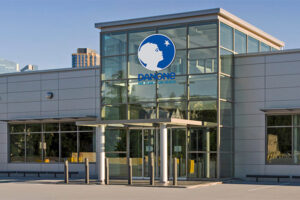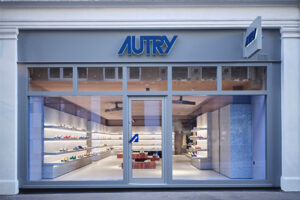ACROSS: WHAT GAP IN THE MARKET HAS LANE7 ADDRESSED?
TIM WILKS: When my children were small, I looked for family activities but found few attractive offers. Eventually, I ended up on the website of the Ham Yard Hotel in London, which had two bowling alleys. That caught my eye, and I started researching bowling concepts from all over the world. Bowling is aimed at families, but most concepts do not respond to current trends and expectations. Bowling was all about plastic seats and bad snacks in the dreary surroundings of a retail park. Therefore, we came up with Lane7 to bring glamour back to bowling. We wanted to create outstanding and entertaining places within city centers.
ACROSS: WHEN DID YOU OPEN THE FIRST ONE?
WILKS: Even though the topic of entertainment or competitive socializing seems new, we have already been on the market for 11 years. We bought our first venue in Newcastle in 2012 and opened in 2013, so we have lots of experience.
What we were doing a decade ago and what we’re doing now is the same business, but it is just far more refined in terms of how we handle the customer and the experience that we deliver. However, the foundations are still the same, from our first venue to the 20th one, which we are building at the moment.
ACROSS: DO YOU RENT YOUR SPACE, OR ARE YOU ALSO OPEN TO DEVELOPING YOUR LOCATIONS?
WILKS: We own three of our sites. Raising cash in the bank is easier if you have a freehold. Then, the bankers have an asset against which to charge the debt. However, getting a freehold in city centers is virtually impossible. We have managed to get three freehold sites over the years, and that’s been a big part of why we have grown. We are always looking. We will be happy to invest if we can find a suitable building within our budget.
ACROSS: WHICH ENVIRONMENT DO YOU CHOOSE FOR YOUR VENUES?
WILKS: Our locations are all in central locations, most in city centers. One is in a blended estate, and we have many locations in shopping centers. Shopping may still be the main reason people go to shopping centers, but customers expect more in the UK and the USA. It is a place for leisure activities. Many stay to eat, meet friends, and engage in entertainment. In shopping centers, we have the challenge of a good and smooth transition from shopping to entering our locations. So, we have to work closely with the center management. First of all, accessibility and visibility are essential.
Many people want to have a look first and then come back a week later. Correct siting is also crucial. We’re happy to be anywhere in the center if we think it’s the right center. To date, however, landlords want us to be close to the F&B offer at all of the shopping centers we are in.

ACROSS: WHAT BASIC STRUCTURAL EXPECTATIONS DO YOU HAVE OF A LOCATION?
WILKS: One of the nice things about our industry is that we clearly communicate to landlords that no two Lane7 locations look the same. We are very flexible and don’t follow a standardized approach. I think this is the general trend for entertainment offers. We take a close look at a location. If we feel that there is enough population density around that shopping center, we will choose the right brand that fits the demographics of that population. Shopping centers in the UK and Europe vary massively in size, depending on whether they target premium or more economy tenants and how good they are generally. So, we need to look at each center on a case-bycase basis. When we decide on a location, we work with the landlord to find the right site.
ACROSS: WHAT SHOULD THE ENVIRONMENT WITHIN THE CENTER IDEALLY LOOK LIKE?
WILKS: That is probably the most critical aspect. We would always prefer a center with a fabulous offer that is well thought through. And, of course, we would like to be in the center of the center, surrounded by other well-performing concepts. As I said, landlords want us near the food market. This area is highly competitive in general and especially in the UK. Landlords think that if we can bring additional customers into that area and give those stores additional coverage, they will be more profitable and stay there for the entire term of their leases. It also works because there are already potential customers eating in those areas who want to have fun at our places afterward.
ACROSS: CAN YOU GIVE AN EXAMPLE OF A GOOD ENVIRONMENT?
WILKS: Our Level X at the St. Enoch Centre in Glasgow is an excellent example of this. There, one of our entrances leads back to the food hall. Therefore, we don’t offer food, so we don’t compete with the food hall operators. That means we have more space to play with. We paid a slightly lower rent because we imposed the noncompete clause. As a result, it has become a great success for everyone.
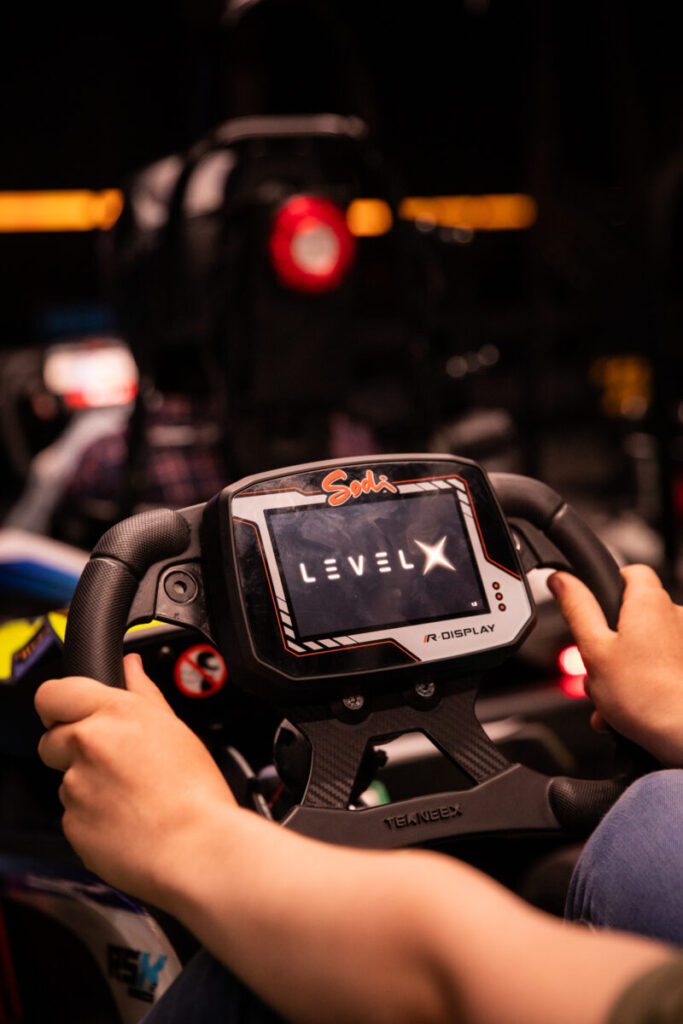
ACROSS: WHAT CONSUMER DEMANDS DO LEISURE CONCEPTS HAVE TO RESPOND TO TODAY?
WILKS: Flexibility and reacting quickly to changes are crucial. It’s unclear to the customer, but we always have a certain percentage of our retail space that can be easily converted. This allows us to adapt quickly as the market develops or simply try out new games. Of course, this comes at a cost.
ACROSS: HOW DO YOU STAY INNOVATIVE?
WILKS: We are constantly scanning the market. My colleagues and I go to two or three trade fairs worldwide every year to ensure we don’t miss any trends. However, a clear focus is also important. The most important thing is that we are a bowling company, and we have always remained very loyal to bowling because it has stood the test of time. Bowling has been around the world for 60 years. We know that this is our core offering.
ACROSS: CONSUMER DESIRES ARE, NEVERTHELESS, CONSTANTLY EVOLVING.
WILKS: Every industry has big winners and equally big losers when it comes to serving the younger generation and how they want to interact with phones and technology. I think we’re embracing that. We still offer credit at our venues, for example. So, if you come with 10 people, you can have drinks, add them to the bill, add different activities, and pay at the end.
We’ve tried QR codes and using a tech device, but we’ve found that credit is still the best way for customers to have the best experience. Of course, this may change in the future. I think, at all high street retail and leisure outlets as well as restaurants and hotels, we’re all constantly re-evaluating because it’s ever-changing at the moment, which is exciting if you’re a customer. As an operator, it can be rather stressful.
ACROSS: YOU LAUNCHED YOUR FIRST LOCATION OUTSIDE ENGLAND AT THE PLAYCE IN BERLIN. WHY BERLIN AND WHY THAT SHOPPING CENTER?
WILKS: The plan to expand into Europe had been around for a while. We kept talking about Amsterdam and Berlin. For purely practical reasons, a location that was easy to reach from the UK, where we are headquartered, was essential to us. To be honest, the offer from Berlin came early for us. As always, you must seize an opportunity when it presents itself. As mentioned, we need a critical mass of people for a new location. We can reach many people with the proper marketing across a vast catchment area. The offer was very good. We probably wanted something edgier, but I love the location because there is a lot going on around it. It is a very safe bet for us. We will do very well there. The Playce is an excellent European foundation site for us to learn from and maybe make a few mistakes along the way as we take on cultural differences and refine the business. A mixeduse estate like The Playce is a great place to start our European journey, mainly because we think it’s a very low-risk location.
ACROSS: WHAT WORKS DIFFERENTLY COMPARED TO YOUR HOME MARKET?
WILKS: We’ve learned a lot about the legal side of things. Specific processes are simply different and slower. At the same time, other things happen rapidly. Of course, agreements get lost in translation from time to time. In hindsight, we would do a few things differently, but that’s how it is when you enter a new market. It’s often the little things; you need good advice and a good relationship with the landlord. One situation recently made me laugh. The manager told me that if I wanted to operate a late bar in Berlin with any credibility, we needed to use paper beer mats, not hard cardboard ones. I thought, “Oh, my God! Let’s order some!” Based on our previous experience, the most important time is the first 90 days after opening. We have to react quickly during that period. Customers will forgive mistakes if they are corrected quickly and credibly. We are in a great neighborhood. Next door to us is the Alchemist, also a concept from the UK, which is very successful. So, we are very confident that we will do well in Berlin.
ACROSS: WHAT DOES YOUR EXPANSION PLAN LOOK LIKE?
WILKS: We are busy. We have six sites to deliver by the end of this year or the early part of next year, including the exciting new sites in Berlin and London’s Camden. We have a great, wellexperienced senior team, and what we’re trying to do is to split the focus of the teams into two parts: running the day-to-day business, and building out these new sites and looking at the wider European expansion.
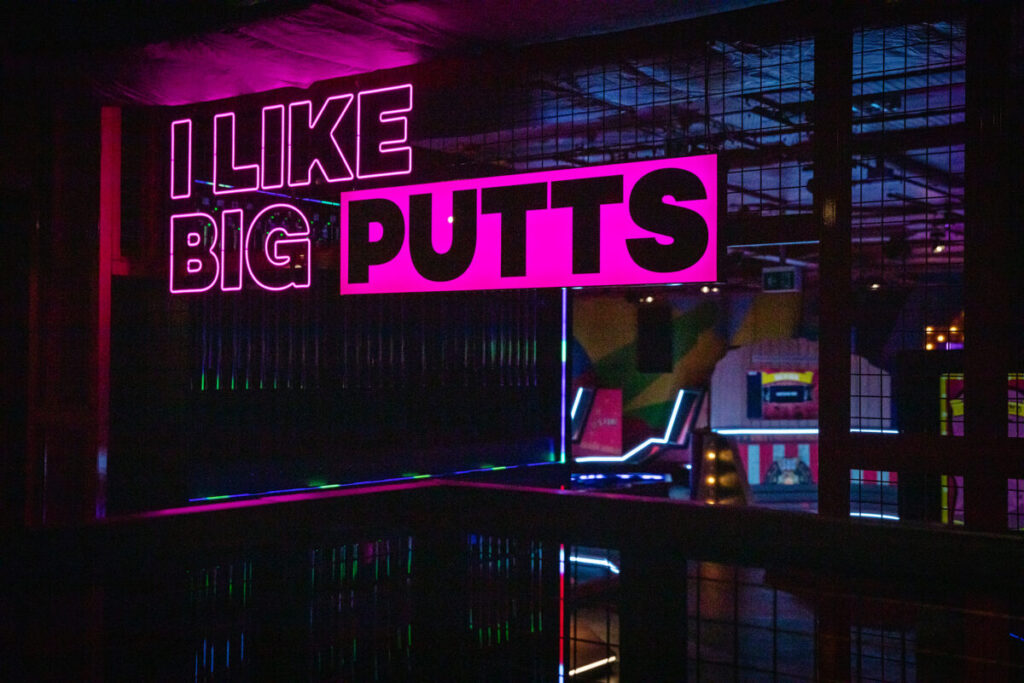
ACROSS: ARE OUTLETS ALSO PART OF THE EXPANSION PLAN?
WILKS: We’re under offer on two outlet sites in the UK. Size is a different topic in this industry. However, we generally seek venues to expand the Lane7 ethos across smaller format spaces. For example, we are looking for a smaller arcade offer. This venue should be around 186 sq m and provide innovative arcade offerings in high footfall locations. Another one would be an immersive gaming experience. So, we are looking for venues of 372 sq m and upwards to create this concept. We are currently making some internal changes within the company, which will all be implemented by March of next year. In the next 18 months, you’ll see whether we become a wider leisure business. Then, we will be able to start with these first locations. Also, shopping centers will demand smaller spaces, and we will have them ready.
ACROSS: ENTERTAINMENT CONCEPTS ARE ABSOLUTELY IN TUNE WITH THE SPIRIT OF THE TIMES AND HAVE ENJOYED A REAL TRIUMPH SINCE THE END OF THE CORONAVIRUS PANDEMIC. CAN SO MANY NEW CONCEPTS SURVIVE SIDE BY SIDE?
WILKS: Regarding activity bars, the UK is leading the world and even exporting to the US. We get plenty of inquiries ourselves. Our market is slightly crowded at the moment. It is a very creative but also an expensive industry. Recently, we saw numerous companies entering the market with minimal budgets. However, after COVID, there were spaces available, and the landlords were happy to fill them. As creative as the concepts were, the implementation was poor and they could not establish themselves.
At the moment, we are in a phase of leveling off. Quality operators with the proper budgets and suitable internal structures will survive. The good thing for the European markets is that they can learn from the UK’s experience. When we started, we had no one to copy. In our opinion, the advantage for mainland Europe is that shopping center landlords do not have to support smaller operators or potentially riskier options, as the markets have already developed.
ACROSS: HOW DO THE CONTRACTS YOU ENTER WITH ASSET MANAGERS DIFFER FROM TYPICAL RETAIL CONTRACTS?
WILKS: The most significant sticking point is that we bring walk-in customers to the landlords – and they know that we can do that. That doesn’t automatically go hand in hand with a reduced rent, however. Before the pandemic, we had difficulty finding suitable locations, as the landlords didn’t need to accommodate us. Things are different today. COVID-19 and the department store implosion in the UK happened, and landlords faced huge, empty fashion outlets. Asset managers were forced to become more creative.
ACROSS: THEY WERE GRATEFUL TO HAVE YOU.
WILKS: Yes, if we don’t fill these voids, the nearby restaurants might also fail, and then you have a domino effect. Asset managers had to ask: Who is my new anchor? Cinemas were struggling. The successful ones were rather premium and small. We are the new anchor! We are boosting the other offerings and reducing the risk that they will not be able to fulfill their contracts. Asset managers have to realize that you will not get the rent and service charge you previously got.
They can’t just look at the individual units; they must understand what we do for the center, which must be reflected in the contracts. In practice, we do a lot of base rent and turnover, so if we do very well, the landlord can get some upside out of it, which also works for us. If things become a bit quiet for us, our overheads go down. That is our preferred deal. I think it’s fair, and it works for the landlord.
- Lane7: 14 locations across the UK and Europe, circa 1400 sq m, targeted at big, high-footfall town and city center locations.
- Gutterball: 1 location in the UK, targeting 1860 – 3720 sq m of space, family-orientated bowling offer.
- Level X: 2 locations in Middlesbrough and Glasgow. Looking for more sites at 3720 sq m and above in prominent box leisure locations. Combination of multiple family entertainment concepts under one roof.

Tim Wilks
Tim Wilks is founder of Lane7 and Level X.

